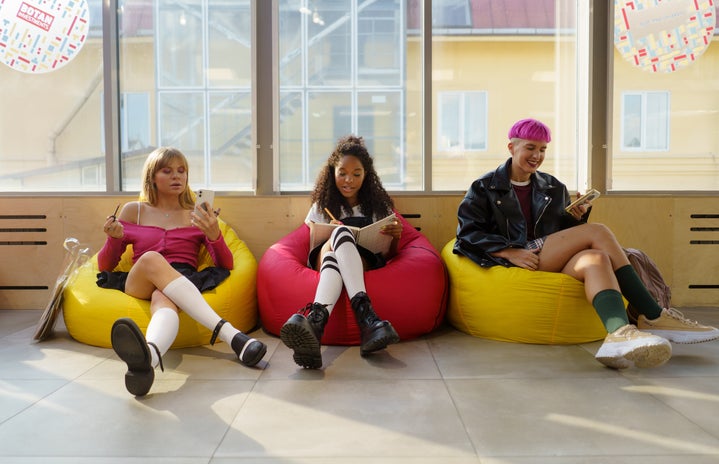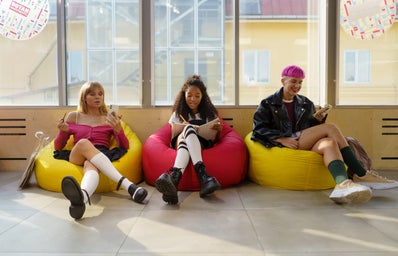HBO Max’s newest film The Fallout, which was written and directed by directorial newcomer Megan Park, has taken the nation by storm. The film’s intense subject matter of a school shooting, paired with its coming of age nostalgia makes it a heavy one; but one that’s beyond important. The New York Times, along with a plethora of other sources, has named the film “The Gen Z Experience.” But what makes it so? And what trends will we hopefully see in the future that makes Gen Z filmmaking a genre of its own?
*Spoilers ahead*
Setting the Scene
We open up the film with its protagonist, Vada (Jenna Ortega), in the car with her best friend Nick (Will Ropp), blasting Juice WRLD’s “Conversations” on their way to school. Along the way, they make a necessary pit stop at Starbucks and practically jump out of their seats, dancing to their anthem throughout the whole ride. This simple moment, as Vada and Nick drive to school, capitalizes on the excited innocence they both share. The moment of being in the car with your best friend listening to your favorite song is familiar to us all and stands as a place of comfort. It’s this comfort that greatly juxtaposes the events that unravel only moments later.
The Event
Around minute eight of the film, we are met with Vada and Mia (Maddie Ziegler) as they tremble in a bathroom stall trying to hide from a school shooter. This event is extremely traumatizing for everyone involved and dramatically changes the course projection of each character’s life.
Dialogue on Trauma
One of the main themes in the film, that stems from this exact moment, is the difference in how people cope with trauma. Vada and Nick cope with their traumas very differently. Almost right after the event, Nick takes action. He set up Zoom meetings with a gun safety organization called “Everytown,” and set up rallies and protests in hopes to prevent any event like this from happening again. Vada dealt with the event much differently. She found a kinship in Mia and they both spent much of their days with one another, ignoring the trauma they endured and just trying to get through their days together.
This is one of the first films I’ve seen that truly highlights the differences in the way people respond to trauma. We’re given a glimpse into the ways each main character reacted to this incident, even those who weren’t actually there. Vada’s little sister Amelia (Lumi Pollack), her mother (Julie Bowen), and her father (John Ortiz) are all given their own scenes to explain how this traumatic event impacted themselves as well.
Gen Z is a generation that encourages a transparent conversation surrounding life traumas. This film successfully evokes a dialogue on this subject that is extremely relevant and significant.
Coming of Age story
Whilst dealing with the after effects of a school shooting, the main characters are also aging like everyone else around them. Time does not stop when one is experiencing trauma; aging and processing occur simultaneously.
This film has moments that discuss a first period, drinking, smoking weed, using ecstasy, the loss of virginity, and other coming of age quarrels. Throughout these experiences, Gen Z-specific vernacular is used to make it relatable for the times we’re in right now, including the use of popular Tik Tok songs and references. There was a scene where Mia and Vada laughed over a popular reference: “Wheelchair Jimmy” — a reference to Vogue’s 73 questions and an overall discussion of influencer culture.
Although these references seem near irrelevant to the plot and are scattered throughout the film, they serve a purpose. Those in this generation who are aware of these references can see themselves in the conversations that these characters are having. And that relatability is extremely powerful.
Tik Tok vs. Trauma
One of my favorite scenes in the whole film was when Vada is lying down on the couch, collecting herself after she just met with a therapist, and Amelia is standing right next to her doing a Tik Tok dance. Vada is staring at the ceiling questioning everything as Amelia does a popular Tik Tok dance to “Tap In” by Saweetie. Amelia does the dance about 5 times to get it perfectly while Vada is lying there, completely still and nearly lifeless throughout. I think this scene exemplifies the difference in experiences for the children of Gen Z. There are those lying there on the couch, crippled by their traumas just trying to process them enough to get up, while the rest are tuned into a social media world mesmerized by an influencer centric society, ignoring the issues that are going on today.
Gen Z Children
Vada’s younger sister, Amelia, is the pinnacle of a Gen Z child. She talks with an assured confidence, like she is much older than she is. She cannot leave the house without a full face of makeup, her cell phone, a near-designer outfit, and her finished “get ready with me routine” for her Youtube channel. Although there is a sense of charm with Amelia’s reverse Peter Pan syndrome, she also comes with an unaware numbness that reflects the events of this generation.
Amelia is not afraid to have translucent conversations regarding death and the shooting, which brings a near shock to her parents and even Vada. Right after the shooting Amelia says the line “I need to Amazon a bullet proof backpack,” like it’s nothing. Like many children in Gen Z, Amelia is aware that school shootings are a common occurrence. Towards the beginning of the film she puts on a front, acknowledging that the shooting is awful but not letting it impact her; it isn’t until the end of the film where we see an honest conversation between her and Vada, where she shares her fears about being in a school shooting too.
Conclusion
The Fallout is a film that has set the curve for modern teen cinema and Park should be proud of her galavant effort in creating a film that sheds light on the experiences that are often only covered by the headlines. The discussions of trauma, the coming of age nature, and the modern references throughout, have created the perfect formula for films of this generation, creating its own genre and putting together something undeniably worth the watch.


